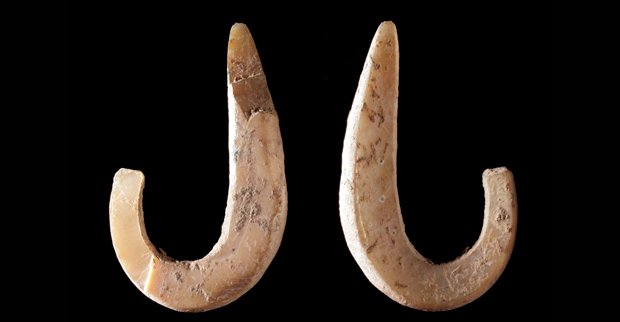World’s oldest fishing hook found

THE WORLD’S OLDEST FISH hook has been uncovered by researchers in East Timor and suggests humans began fishing earlier than previously thought.
Digging in the Jerimalai cave in East Timor, Professor Sue O’Connor from the Australian National University in Canberra and a team of scientists uncovered over 38,000 fish bones from 2,843 fish – dating back 42,000 years.
The big discovery, though, was the unearthing of a fish hook made from a shell, which is between 16,000 and 23,000 years old, according to radiocarbon dating of the charcoal in the soil surrounding the specimen. The oldest-known fish hooks found up until now were only dated back to 5500 years.
The find, reported this week in the journal Science, means early modern humans were sophisticated fishers, using tools to catch their dinner, rather than their hands.
“What the site has shown us is that early modern humans had amazingly advanced maritime skills,” Sue says. “They were expert at catching the types of fish that would be challenging even today, like tuna. It’s an exciting find.”
Oldest fish hook points to skilled fishermen
Fish would have been a primary food source for these ancestral fishermen, “only rats, bats, snakes, lizards and small birds available on land,” Sue says.
However, the researchers can only speculate about exactly how these ancestral fishermen managed to catch the deep-sea fish.
“It’s not clear what method the occupants of Jerimalai used to capture the fish,” Sue says. “But it seems certain that these people were using quite sophisticated technology and watercraft to fish offshore.”
Professor Steve Webb, from Bond University, Queensland hails the finds as “probably the best discovery of an attachment of people to the sea in this region.”
He adds that “prehistoric Aborigines likely had a maritime economy.” That is, they knew boats and could fish, so they stayed close to the oceans and rivers, he says.
Early human migration via the sea
One of the great puzzles of human migration is how and when Australia was first colonised. Recent research has pointed to arrival of Aboriginal Australians over 50,000 years ago, having migrated from Africa through Asia about 75,000 years ago.
“We have known for a long time that Australia’s ancient ancestors must have been able to travel hundreds of kilometres by sea because they reached Australia by at least 50,000 years ago,” Sue says.
“When we look at the watercraft that Indigenous Australians used at the time of European contact, however, they are all very simple, like rafts and cones. So how people got here at such an early date has always been puzzling. These new finds from Jerimalai cave go a long way to solving that puzzle.”
RELATED STORIES

